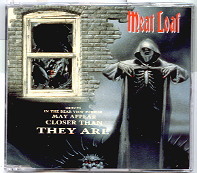Objects in the Rear View Mirror May Appear Closer than They Are
| "Objects in the Rear View Mirror May Appear Closer Than They Are" | ||||
|---|---|---|---|---|
 |
||||
| Single by Meat Loaf | ||||
| from the album Bat Out of Hell II: Back into Hell | ||||
| Released | 1994 | |||
| Format | CD, cassette | |||
| Recorded | Ocean Way Recording (LA) | |||
| Genre | Progressive rock, soft rock | |||
| Length |
10:15 (main version) 5:55 (single edit) |
|||
| Label |
MCA (North America) Virgin (Europe & Japan) |
|||
| Songwriter(s) | Jim Steinman | |||
| Producer(s) | Jim Steinman | |||
| Meat Loaf singles chronology | ||||
|
||||
"Objects in the Rear View Mirror May Appear Closer Than They Are" is a song composed and written by Jim Steinman, and recorded by Meat Loaf. The song was released in 1994 as the third single from the album Bat Out of Hell II: Back into Hell and it reached #38 on US's Billboard Hot 100, and #26 in the UK Top 40. With its chart success, this song became the hit with the longest un-bracketed title as of 2007[update]. The title is derived from the safety warning on car side mirrors in the US, "Objects in mirror are closer than they appear".
Parts of the melody were adapted from Steinman's earlier tune "Surf's Up," which was on the album that he both wrote for and sang lead on, entitled Bad for Good. Steinman later reused the melody, with new lyrics by Michael Kunze, for "Die Unstillbare Gier", a song in the Tanz der Vampire productions, and for "Confession of a Vampire" in the ill-fated US version (Dance of the Vampires).
Musically it could be noted that the piano chords played by Bruce Springsteen's E-Street Band member and long time Jim Steinman studio pianist Roy Bittan consist mainly of dual voicings as opposed to the usual triads. E.g. the initial F-Major chord is played only with the "c" and the "a" while the triad completing "f" is played an octave lower with the left hand. This subtle pattern continues throughout almost the entire song except where dramatic power chords are used.
"Objects in the Rear View Mirror May Appear Closer Than They Are" is a three-part narrative, centred upon the seasons summer, winter and spring. According to Allmusic, it draws "its inspiration from the singer’s often-tragic childhood. The lyrics portray a man who has overcome tragedies in his life yet still feels haunted by their memory."BBC.co.uk also says that the song about a "melancholy middle-aged man reminiscing about his youth... is in many ways uncomfortably close to home, dealing as it does with episodes uncannily similar to events in his own life." Steinman says that it was "the hardest song to write and get across."
...
Wikipedia
